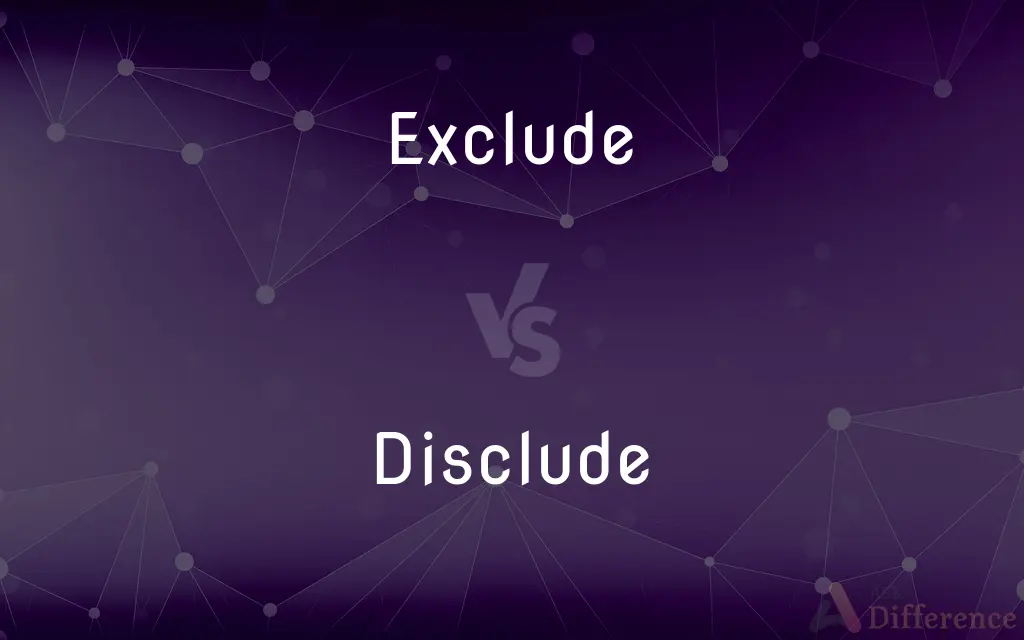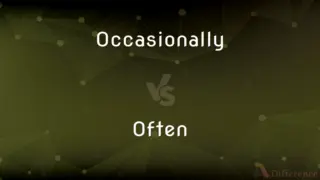Exclude vs. Disclude — What's the Difference?
By Fiza Rafique & Maham Liaqat — Updated on March 20, 2024
Exclude is to deliberately leave something out or deny access, while "disclude" is not a standard word in English; instead, "include" is its antonym, meaning to embrace or contain as part of the whole.

Difference Between Exclude and Disclude
Table of Contents
ADVERTISEMENT
Key Differences
Exclude is a commonly used term in English that means to leave out or prevent someone or something from being involved or considered. It implies an active decision or process where certain elements are not allowed participation or consideration in a group, activity, or collection. On the other hand, "disclude" is often mistaken as the opposite of include but is not recognized as a standard English word. The correct term for allowing participation or considering something as part of a group or collection is "include."
In various contexts, such as social groups, legal documents, or data sets, to exclude means to intentionally remove or keep something or someone apart from a particular context. This action can be based on specific criteria, rules, or decisions. Conversely, the concept that some believe "disclude" represents excluding something relies on a misunderstanding; the appropriate term for the action of not including is simply "exclude."
The act of excluding can carry significant implications, depending on the context. It might involve social exclusion, where individuals or groups are systematically blocked from rights, opportunities, and resources. In contrast, since "disclude" is not a valid term, discussions about inclusion and exclusion use the correct terminology to articulate the inclusion or exclusion of elements in discussions, policies, and practices.
Educational and professional settings often emphasize inclusivity, aiming to include as wide a range of individuals and perspectives as possible. When exclusion occurs in these environments, it's a deliberate choice to leave certain ideas, behaviors, or individuals out to maintain a certain standard or harmony. The concept of "discluding," or rather, the act of not including, would apply to these situations, but the correct terminology remains using "exclude" for actions taken to remove or keep something out and "include" for actions to embrace or incorporate.
While exclude is a widely recognized and used term in English for indicating the action of leaving something out or denying access, "disclude" is not an accepted term, and discussions about the presence or absence of something should correctly use "exclude" and "include" to describe such actions.
ADVERTISEMENT
Comparison Chart
Definition
To deliberately leave out or deny access or inclusion.
Not a recognized English word; often confused with exclude.
Usage
Common in various contexts to indicate removal or denial of access.
Incorrect usage; does not exist in standard English.
Context
Legal, social, educational, professional, and more.
N/A
Implications
Can imply an active decision to remove or deny.
N/A
Correct Antonym
Include (to contain as part of the whole).
N/A
Compare with Definitions
Exclude
To omit from consideration or outside the scope.
Special offers exclude items already on sale.
Disclude
To make part of a group or collection.
We included her in the email loop for updates.
Exclude
To block someone from access or participation.
He was excluded from the club for breaking the rules.
Disclude
To consider as part of something.
The course includes an introduction to basic concepts.
Exclude
To leave out from a group or collection.
The study excludes data from incomplete surveys.
Disclude
To contain as a part of a whole.
The anthology includes works from various authors.
Exclude
To deliberately not consider or include.
The budget excludes any funding for new projects.
Disclude
To embrace or encompass within a whole.
The museum's exhibit includes artifacts from ancient civilizations.
Exclude
To prevent from being included, considered, or accepted.
The rule excludes anyone under 18 from participating.
Disclude
To allow participation or presence in.
The program is designed to include participants of all skill levels.
Exclude
Deny (someone) access to a place, group, or privilege
The public were excluded from the board meeting
Disclude
(nonstandard) To disclose, make known.
Exclude
Remove from consideration
One cannot exclude the possibility of a fall in house prices
Disclude
(nonstandard) To exclude, not include; to remove from inclusion.
Please disclude me from further discussions on this topic.
Exclude
To prevent from entering; keep out; bar
A jar sealed to exclude outside air.
An immigration policy that excludes undesirables.
Exclude
To prevent from being included, considered, or accepted; reject
The court excluded the improperly obtained evidence.
Exclude
To put out; expel.
Exclude
(transitive) To bar (someone or something) from entering; to keep out.
Exclude
(transitive) To expel; to put out.
To exclude young animals from the womb or from eggs
Exclude
(transitive) To omit from consideration.
Count from 1 to 30, but exclude the prime numbers.
Exclude
To refuse to accept (evidence) as valid.
Exclude
To eliminate from diagnostic consideration.
Exclude
To shut out; to hinder from entrance or admission; to debar from participation or enjoyment; to deprive of; to except; - the opposite to admit; as, to exclude a crowd from a room or house; to exclude the light; to exclude one nation from the ports of another; to exclude a taxpayer from the privilege of voting.
And none but such, from mercy I exclude.
Exclude
To thrust out or eject; to expel; as, to exclude young animals from the womb or from eggs.
Exclude
Prevent from being included or considered or accepted;
The bad results were excluded from the report
Leave off the top piece
Exclude
Prevent from entering; shut out;
The trees were shutting out all sunlight
This policy excludes people who have a criminal record from entering the country
Exclude
Lack or fail to include;
The cost for the trip excludes food and beverages
Exclude
Prevent from entering; keep out;
He was barred from membership in the club
Exclude
Put out or expel from a place;
The child was expelled from the classroom
Common Curiosities
What is the difference between excluding and discriminating?
Excluding refers to the act of leaving out or denying access, which can be based on objective criteria, while discriminating involves making unjust or prejudicial distinctions in the treatment of different categories of people.
How can inclusion be promoted in a community?
Inclusion can be promoted by actively ensuring that opportunities, resources, and participation are accessible to all members, regardless of their background or characteristics.
What are the consequences of exclusion in the workplace?
Exclusion in the workplace can lead to decreased morale, reduced productivity, and can contribute to a hostile work environment.
Is it ever acceptable to exclude information from a report?
Yes, it may be acceptable to exclude information from a report if the information is irrelevant, confidential, or outside the scope of the report's objectives.
What are examples of exclusions in insurance policies?
Insurance policies may have exclusions that deny coverage for certain conditions, activities, or circumstances, such as pre-existing conditions or extreme sports injuries.
Is "disclude" a valid English word?
No, "disclude" is not recognized as a valid English word. The correct term for the opposite of exclude is include.
Can technology be designed to exclude users?
Yes, technology can be designed with certain limitations or requirements that inadvertently or deliberately exclude some users from being able to access or fully use it.
What does it mean to exclude someone?
To exclude someone means to deliberately prevent them from participating in or being part of a group, activity, or opportunity.
Can a policy be designed to exclude certain behaviors?
Yes, policies can be designed to exclude certain behaviors by setting rules or standards that prevent those behaviors from being acceptable within a specific context.
How does social exclusion affect individuals?
Social exclusion can lead to feelings of loneliness, depression, and can impact an individual's overall well-being and ability to participate in society.
Share Your Discovery

Previous Comparison
Paratope vs. Epitope
Next Comparison
Occasionally vs. OftenAuthor Spotlight
Written by
Fiza RafiqueFiza Rafique is a skilled content writer at AskDifference.com, where she meticulously refines and enhances written pieces. Drawing from her vast editorial expertise, Fiza ensures clarity, accuracy, and precision in every article. Passionate about language, she continually seeks to elevate the quality of content for readers worldwide.
Co-written by
Maham Liaqat













































